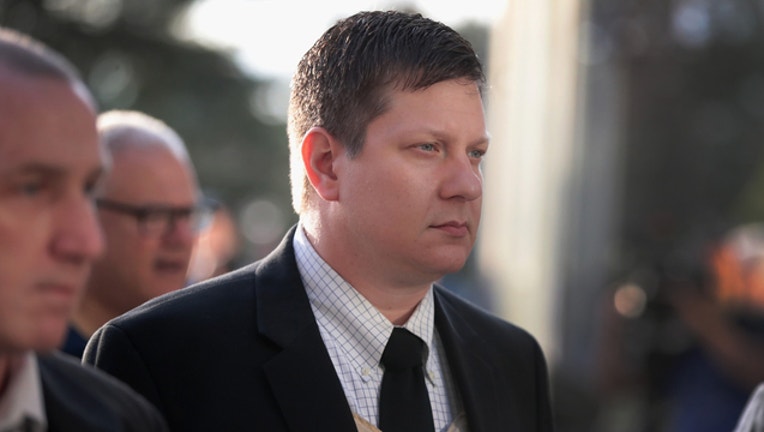Race central to Van Dyke case, even if jury doesn't hear it

Jason Van Dyke | Photo by Scott Olson/Getty Images
CHICAGO (AP) -- In front of jurors in the trial of a white Chicago police officer charged with murder in the shooting of a black teenager, race is hardly mentioned at all.
Just once, during opening statements, have prosecutors even brought up the fact that 17-year-old Laquan McDonald was black, drawing a sharp rebuke from a defense attorney for Officer Jason Van Dyke. Yet the trial is being watched closely in Chicago and around the country as another chapter in a long national story about race and law enforcement.
"At this point we have no precedent that says an African-American can get justice in this country when they are shot down in cold blood by a police officer," the Rev. Marvin Hunter, McDonald's great uncle, told reporters this week, trying to put the case in historical context. "From the days of Jim Crow until today we have never gotten justice for anything that has happened to us as African-Americans ... by rogue and unjust police officers."
The issue of race permeates the case -- from concerns that releasing video of the shooting would ignite racial tensions in a city with a long history of troubled police relationships with minority communities, to protests after it was finally made public, to allegations during jury selection that Van Dyke's attorneys were trying to keep blacks from sitting on the panel, to concerns about possible unrest if Van Dyke is acquitted.
The shooting of McDonald happened on Oct. 20, 2014, just a few months after a white officer shot 18-year-old Michael Brown in Ferguson, Missouri, leading to months of sometimes-violent protests. In April 2015, the same month Freddie Gray died in police custody in Baltimore , touching off protests there, Chicago was agreeing to pay $5 million to McDonald's family for his death.
It would be seven more months before the release of squad car video that would appear to contradict officers' accounts that McDonald had lunged at police with a small knife he had in his right hand. Even before its release, rumors swirled that the video would lead to unrest in a city where the names Fred Hampton and Mark Clark, two Illinois Black Panther Party leaders killed in a 1969 police raid, still resonate in the black community.
The trial is of such consequence that local activist William Calloway has held community meetings to prepare residents for the disappointment an acquittal would bring and perhaps head off the kind of violent confrontations that erupted in Baltimore and Ferguson -- his concerns silently underlined by Van Dyke and his wife, Tiffany, as they left the courthouse holding hands, both wearing bulletproof vests.
Calloway said there is really no other way to see Van Dyke's trial than as a "watershed moment" for the city.
"This is the first time in my life, and I'm 29, when there have been hundreds of police shootings and dozens ended up fatal, that a Chicago cop has gone on trial for first-degree murder," he said.
A University of Illinois at Chicago sociologist who's written extensively on segregation and racial attitudes agrees.
"I think people are watching this very carefully and through a racial lens that will have implications for race relations," said Maria Krysan.
The case's impact on race relations was underscored when the Rev. Jesse Jackson told a reporter that the 16 shots fired into the body of McDonald was "the most heinous crime since the lynching of Emmett Till," the 14-year-old Chicago boy whose killing in Mississippi in 1955 shocked the nation and galvanized the civil rights movement.
If that sounds like hyperbole, consider what McDonald's death has wrought since a judge forced the city to release video of the shooting: a police superintendent fired from his job, a top prosecutor losing hers at the polls, and a U.S. Justice Department investigation that ended with a scathing report that found a history of widespread civil rights abuses by the police force.
Inside the courtroom , Van Dyke's attorneys have argued that he was afraid for his life and acted according to his training when he shot McDonald, while prosecutors have stressed that no other officers opened fire. Prosecutors rested their case Thursday and defense attorneys are expected to call witnesses on Monday.
Race became an issue during jury selection when prosecutors accused defense attorneys of illegally trying to keep minorities from sitting on the jury. The 12-person jury includes just one African-American member, although blacks make up one-third of Chicago's population. Defense attorneys used preemptory challenges -- an objection in which attorneys don't have to state a reason for wanting someone off the jury -- to remove at least three African-Americans from the jury. But the judge said he was satisfied that the challenges were "race-neutral." The jury also has seven whites, three Hispanics and one Asian-American.
Special prosecutor Joseph McMahon touched on race in his opening statement when he noted that Van Dyke didn't know that McDonald was a ward of the state or had PCP in his system when the officer encountered him that fall night.
"What he did see was a black boy walking down a street ... with the audacity to ignore the police," McMahon said.
"The government wants to you think this is a racial issue," Van Dyke's lead attorney Dan Herbert later told the jury. "Race had absolutely nothing to do with this."

